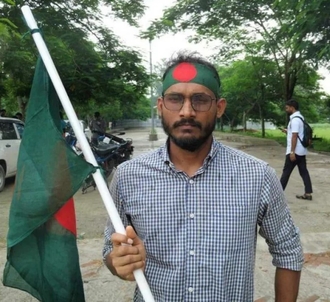The trial in the murder case of Abu Sayed, who was killed in Rangpur during an anti-discrimination student movement, has commenced.
The formal judicial proceedings began on Wednesday at the International Crimes Tribunal-2, led by Justice Nazrul Islam Chowdhury, with the opening statement by Chief Prosecutor Tajul Islam.
Following the opening statement, two videos showing Abu Sayed being shot were presented to the tribunal.
Abu Sayed’s father, Makbul Hossain, who was present in the tribunal, became emotionally overwhelmed upon seeing the footage of his son being shot. He was seen wiping his eyes repeatedly.
Later, in response to the prosecution’s petition, the tribunal set Thursday as the date for the first testimony in the case.
Previously, on July 30, the chief prosecutor, on behalf of the prosecution, had requested the framing of charges in this case. Subsequently, on August 6, the tribunal formally framed the charges and scheduled August 27 for the opening statement.
Among the 30 individuals formally accused in this case, six arrested accused were present in the tribunal’s dock today. They are former proctor of Begum Rokeya University Shariful Islam, former assistant registrar Rafiul Hasan Russell, former contractual employee of the Registrar’s Office Md Anwar Parvez, former assistant sub-inspector (ASI) of police Amir Hossain, former constable Shujon Chandra Roy, and Bangladesh Chhatra League leader Imran Chowdhury alias Akash.
On June 30, the International Crimes Tribunal-2 had taken cognizance of the formal charges against 30 individuals in the case concerning crimes against humanity related to the murder of Abu Saeed.
Abu Sayed was shot near the park intersection in front of Begum Rokeya University during last year’s student-led mass uprising. The 25-year-old Abu Sayed was a student of the 12th batch in the English Department of Begum Rokeya University. He was one of the coordinators of the university’s movement for quota reform.
When the video of the unarmed Abu Sayed being shot by the police in front of the university went viral, it sparked discussions and criticisms across the country.
Abu Saeed’s death was one of the key incidents that galvanised the movement in its early stages.


